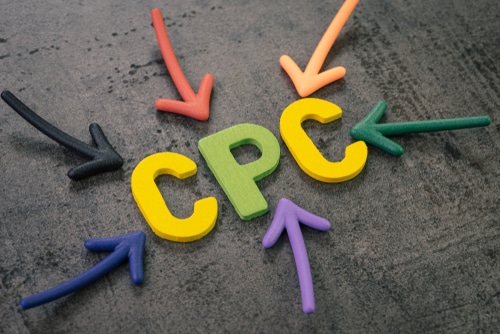As you delve deeper into your business’ online advertising, one term that will repeatedly surface is cost per click, or CPC. While it may seem complex initially, grasping the concept of CPC is important for effectively managing your marketing budget and attracting future customers. Let’s unravel the intricacies of CPC and its pivotal role in business growth.
What Is Cost per Click (CPC)?
Simply put, cost per click (CPC) refers to the amount you pay each time someone clicks your ad online. This is a common method used in search engine marketing, such as Google Ads, and social media platforms. When you bid on keywords that relate to your products or services, you’re essentially entering a little auction. If someone clicks your ad, you pay the amount that you bid. Think of it as a way to buy traffic to your website — all you need is a good strategy.
Why Is CPC Important?
CPC can help you manage your budget, measure ad performance, drive traffic to your website, and offer you ad cost controls.
Budget Management
Knowing your CPC helps you manage your advertising budget more effectively. By understanding how much you’re spending per click, you can optimize your ad spend and get more bang for your buck.
Performance Measurement
Keeping an eye on CPC lets you see how well your ads are doing. If you notice your CPC is higher than expected, it might mean your keywords are super competitive, and it’s time to reassess your strategy.
Driving Targeted Traffic
One of the best aspects of CPC is that it’s not just about clicks, it’s about attracting more targeted traffic. Since users clicking on your ad are actively looking for what you offer, there’s a better chance they’ll turn into customers. This targeted approach can give you confidence in the effectiveness of your advertising strategy.
Flexibility and Control
CPC gives you a powerful tool to control your costs. You can adjust your bids based on how well your ads are performing, allowing for more flexibility in how much you want to spend. This control enables you to make informed strategic decisions that can significantly impact your advertising efficiency.
How Is Cost per Click Calculated?
Calculating your CPC is pretty straightforward. Here’s the formula you need:
CPC = Total Cost of Campaign ÷ Total Clicks
For instance, if you spent $200 on a campaign and received 100 clicks, your CPC would be $2. This easy equation helps you understand just how much you’re paying for that traffic.
What Is the Average Cost per Click in Google Ads?
The average CPC can vary based on several factors, including your industry and the competition for specific keywords. For search ads, CPCs generally range from $1 to $2, while display ads typically cost less than $1. However, in competitive fields like finance or law, CPCs can exceed $50. Knowing what to expect in your industry can help you better plan your budget.
How to Reduce CPC
Optimize Keywords
Consider using long-tail keywords, which are more specific and usually have less competition. While they might bring in fewer clicks, they can attract more qualified leads, ultimately saving you money.
Improve Quality Score
Google assigns a Quality Score to your ads based on how relevant they are. The higher your Quality Score, the lower your CPC can become. So, work on improving your ad relevance and landing page experience to get those costs down.
Regularly Analysis and Adjust
Don’t let your campaigns go stale. Regularly checking in on performance and adjusting your bids based on what’s working (or not) is key. This proactive approach can help you stay in control of your advertising performance and make informed decisions for future campaigns.
Use AI Tools
Using the latest AI-powered bidding tools, you can continuously optimize your bidding strategy in real time, automating the process and saving yourself both time and money.
How to Calculate Cost per Click
If you want to calculate CPC for a specific keyword or ad group, follow these simple steps:
Set Your Parameters
Decide on the time frame for your analysis, total ad spend, and the number of clicks associated with the keyword or ad group you’re measuring.
Plug in the Data
Plug in the data of these parameters into the formula {CPC = Total Cost of Campaign ÷ Total Clicks} to figure out your CPC on this ad segment.
Analyze for Insights
Once you get the CPC, take a moment to see how it fits into your overall campaign performance. Are you getting enough conversions to justify the spend? This can help you tweak future ads.
Key Takeaways
Cost per click (CPC) is a crucial metric in online advertising, one that plays a significant role in helping businesses manage their costs while driving targeted traffic to their websites. It’s important to note that the average CPC can vary significantly depending on the industry, so businesses should have a clear understanding of what is typical for their specific market to set realistic budgets. Lowering your CPC can greatly enhance the efficiency of your advertising efforts. To achieve this, focus on optimizing your keywords, improving your Quality Score, and regularly analyzing your campaign performance. By taking these steps, you can maximize your advertising effectiveness and ensure that your budget is well-utilized.
Frequently Asked Questions (FAQs)
CPC vs. CPM (cost per 1,000 impressions): What’s the difference?
CPC, or cost per click, means you only pay when someone clicks on your ad. CPM, or cost per 1,000 impressions, is about paying for how many times your ad is shown, regardless of whether anyone clicks on it. Your choice between the two will depend on your specific marketing objectives.
What is eCPC (enhanced cost per click)?
eCPC is a fancy name for an automated bidding strategy that adjusts your bids to help maximize conversions, while still aiming to keep your average CPC within a certain target range. It’s a great way to simplify your campaign management.
What Google Ads alternatives do marketers have?
There are plenty of options besides Google Ads. Consider Facebook Ads, LinkedIn Ads, or Bing Ads, each offering unique features, search capabilities, and audiences. Depending on who you’re trying to reach, one of these might just be a perfect fit for your campaign.



